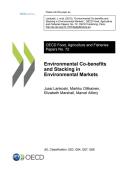
Long before the Kyoto Protocol was signed, a number of companies and NGOs started to invest voluntarily in forest carbon offsets thereby creating a voluntary carbon market. Within the climate movement, the assessment of forest carbon offsets for mitigating climate change is one of the major ‘battle lines.’ A large group of critical civil-society actors categorically rejects these instruments. This group sets the formation of carbon markets in the wider context of finance-driven neoliberalism. Rather established international NGOs, such as Conservation International actively support forest carbon offsets as additional incentives for forest conservation. In 2005 international NGOs, companies and academic institutions developed the Climate, Community and Biodiversity Standards (CCB). CCB standards aim to guarantee that certified projects mitigate climate change and contribute to local development and habitat conservation. Drawing on two forest carbon offsets certified according to the CCB standards this contribution analyzes the role of civil society actors within forest carbon offset governance and seeks to evaluate the in- and output legitimacy of the CCB standards.
As the world economy slowly recovers from one of the longest and most severe global slowdowns in history, there has been growing interest in how fluctuations in economic activity interact with climate change policy. Of particular interest is how carbon pricing instruments, such as emissions trading systems and carbon taxes, are designed and operate. This policy brief analyses the relevant empirical evidence and theoretical research on how carbon pricing instruments function in recessions and booms.
This Discussion Paper presents a normative concept of green industrial policy, which is defined as encompassing any policy measure aimed at aligning the structure of a country’s economy with the needs of sustainable development within established planetary boundaries. The paper elaborates on the rationale of a green industrial policy, how it differs from conventional industrial policy, why it is faced with significantly bigger challenges, and how these can be met.
The carbon markets are in the middle of a fundamental crisis - a crisis marked by collapsing prices, fleeing actors, and ever increasing greenhouse gas levels. Yet carbon trading remains at the heart of global attempts to respond to climate change. Not only this, but markets continue to proliferate - particularly in the Global South.
The book helps to make sense of this paradox and brings two urgently needed insights to the analysis of carbon markets. First, the markets must be understood in relation to the politics involved in their development, maintenance and opposition. Second, this politics is multiform and pervasive. Implementation of new techniques and measuring tools, policy development and contestation, and the structuring context of institutional settings and macro-social forces all involve a variety of political actors and create new forms of political agency. The contributions study the total extent of the carbon markets, from their prehistory to their contemporary expansion and wider impacts.
